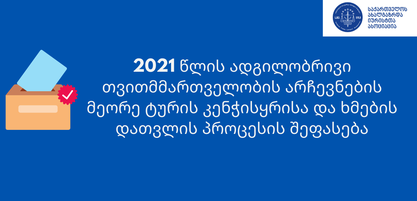NEWS

Georgian Young Lawyers’ Association, within the framework of the Short-Term Observation (STO) Mission, provides public with the information about the polling and counting of the votes during the second round of the local self-government elections. Based on the information collected by the GYLA’s observers, we address the issues related to the closing of polling stations and the beginning of the vote counting, as well as the tendencies observed in and around the polling stations in the second part of Election Day.
In the nearby territories of various precincts, GYLA observers recorded facts of verbal and physical confrontations, which resulted in the hindrance of the voting process in some cases. The situation was especially tense in the second part of the day in Zugdidi, Rustavi, Isani, and Batumi precincts. At several occasions, it became even necessary to call the police.
The facts of obstructing the monitoring process of GYLA observers and professional activities of journalists, including verbal assaults by the members of the commission and observers of other organizations, were concerning.
With regard to voting procedures inside the polling station, at some polling stations GYLA identified various irregularities and violations, such as non-compliance with the rules for casting lots, improper filling/publishing of the election documents, failure to fulfill inking and polling procedures, violation of Covid-19 regulations.
In some precincts, deficiencies concerning the improper placement of publicly available documents (rules for filling out and invalidating ballots, data for the demonstration protocol, and the list for mobile ballot box) and taking photos/videos.
In addition to that, GYLA observers recorded cases regarding the control over the will of voters inside some polling stations.
Violations of election regulations were also recorded after closing the polling stations. In Senaki #13 precinct, following the request of the GYLA’s observer, 23 ballots were considered invalid since the signature and seal were missing. In another case, for example, in Saburtalo #33 precinct, 4 disputed ballots were invalidated, however, according to the GYLA observer, the voter had explicitly expressed the will (a signature has been included alongside the selected candidate). In Isani #62 precinct, the overall number of ballots exceeded the number of signatures in all types of lists. Cases of delivering election day-log books to the district election commissions in unsealed condition were also observed in various precincts.
In sum, GYLA’s observers, considering the above-mentioned violations, filed 31 complaints and recorded 20 remarks throughout the Election Day.
GYLA continues monitoring of the post-election period (studying summary protocols of PECs and observation of the process of summarizing the voting results at higher election commissions). The organization plans to prepare the final report that will evaluate both the pre-election period and the Election Day.
Georgian Young Lawyers’ Association`s Short-Term Observation Mission on the Election Day
Georgian Young Lawyers’ Association`s short-term observation mission during the second round of the local self-government elections consisted of 300 observers in district and precinct election commissions covering 9 municipalities across the country.
On Election Day, GYLA operated a hotline number for the citizens, which enabled them to receive legal consultations as well as any information regarding electoral procedures, violations on the polling day, and the ways of responding to them.
GYLA held three press conferences regarding the process of Election Day observation at the NGO Media Center throughout the day. The press conferences were held at 12:00, 16:30, and 21:00.
GYLA’s monitoring mission on the voting day of the local-self Government elections was made possible with the funding of the British Embassy and Open Society Georgia Foundation (OSGF).
The opinions expressed in the statement are those of the Georgian Young Lawyers’ Association and its content may not express the views of the donor organizations.
SHARE: